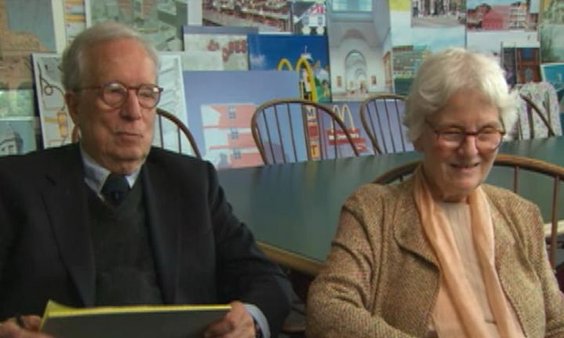NEXT STORY

How men and women are treated differently
RELATED STORIES

NEXT STORY

How men and women are treated differently
RELATED STORIES


|
Views | Duration | |
|---|---|---|---|
| 101. Chinese scholars gardens and lilong housing | 42 | 05:45 | |
| 102. The future | 41 | 04:23 | |
| 103. Designing medical centers (Part 1) | 18 | 04:05 | |
| 104. Designing medical centers (Part 2) | 18 | 04:57 | |
| 105. Robert Scott Brown and how we met | 55 | 03:30 | |
| 106. The development of the theory of planning class | 26 | 07:44 | |
| 107. Our courtship | 44 | 02:19 | |
| 108. Words: oppression and persecution | 26 | 01:45 | |
| 109. Losing a job and accusations of insularity | 32 | 02:05 | |
| 110. How men and women are treated differently | 53 | 01:42 |


[DSB] When we had this really horrific experience with the Fine Arts Commission in Washington, where we were given a job… and… we entered a competition and we won the competition. And we were turned down by the Fine Arts Commission and then, finally lost the job because what we had to design for the Fine Arts Commission could not be built. And with overtones of cruelty from Gordon Bunshaft that, you know, if you want to talk about oppression, they were right there. Describing it to some people, it was interesting, some of them… ‘Oh God, I can’t believe this it really is awful, what you must have felt’. Others laughed. And I often tried to interpret that laugh. And I think it was people who felt so threatened by that story they just didn’t know what to do. And I think the discomfort Will had felt was because he felt so threatened, he didn’t know what to do.
Other people have described you both as insular. Do you think you’re insular?
[RV] What do they mean by that?
[DSB] Can’t hear them, basically. Don’t listen to them. I think that in the process of designing there are times when we are very open and there are times when we dig our heels in. The times when we’re very open, we get the maximum of information we need and I’ve described processes for doing it, and the times when we dig our heels in is when a certain president at a certain university says, ‘I don’t care what you say, you will not have chequerboard patterns on this floor because it’s like kitchens’. Well, it’s also like the original floor, for one thing. So, we dug our heels in. That president would find us insular. Insularity lies in the eye and the heart of the beholder, as much as in the projector.
Internationally renowned architects Robert Venturi (1925-2018) and Denise Scott Brown (b.1931) have helped transform contemporary design through their innovative architecture and planning. Winners of numerous prestigious awards, their designs have championed multiculturalism, social activism, symbolism, pop culture, history and evolving technologies.
Title: Losing a job and accusations of insularity
Listeners: Thomas Hughes
Thomas Hughes is Mellon Professor Emeritus of the History of Science at the University of Pennsylvania and Distinguished Visiting Professor at the Massachusetts Institute of Technology. His most recent books include Human Built World, Rescuing Prometheus and American Genesis. He is a member of the American Philosophical Society, US National Academy of Engineering, Royal Swedish Academy of Engineering Sciences and the American Academy of Arts and Sciences.
Duration: 2 minutes, 5 seconds
Date story recorded: 22nd to 23rd September 2006
Date story went live: 27 May 2010